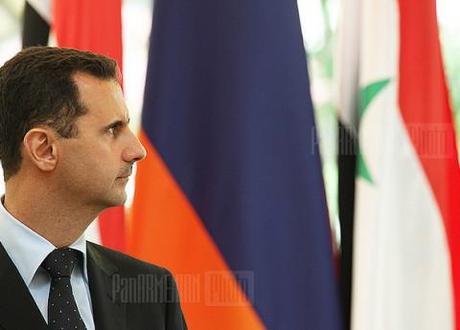
Syrian President Bashar Al-Assad. Photo credit: PanArmenian_photo
The background
The situation in Syria has reached a “tipping point,” said the UN special envoy, Kofia Annan. After the massacre at Houla, many countries have expelled Syrian duplomats. Annan has called on President Assad to create a plan. Over 100 people were killed in Houla, near the city of Homs, including 34 women and 49 children, reported The Washington Post; most were shot at close range. The Times said that those civilians who had survived were united in saying that the attacks had been done by the Shabiya militia; the Syrian government claims it was terrorists. Military intervention by the UN security council has not been ruled out, reported the BBC.
Since Kofi Annan was given the task of implementing a peace plan in March, 1,000 people have died in Syria. An estimated 12,000 have died in the last 14 months, said The New York Times. Commentators are discussing whether intervention is the right thing to do, given the tough economic times in the West, and the lessons that have been learned from Libya. Russia is the main sticking point, since Vladimir Putin wants to keep Syria as its ally; but in any case, how do we know that what’s coming from the Syrian rebels is the truth?
“Syrian people do not want their future to be one of bloodshed and division,” said Kofi Annan, quoted on the BBC.
Time for the US to intervene
Houla isn’t “unique, just better documented,” said The Washington Post’s hawkish editorial. Annan’s mission is a costly failure. The US has been hiding behind the UN. Now the US is trying to rely on President Putin of Russia to help pressurise Assad into stepping down. But that’s unlikely to happen. Bloodshed in Syria “will continue.” Obama should take action, now, before the costs become even greater.
Read about the Houla massacre on Periscope Post
The West should be careful – and intervene in other ways
The massacre at Houla is reminiscent of the Sarajevo market shelling in 1994, said Gideon Rachman in The Financial Times. Next day the UN called for air strikes. People use Bosnia as a parallel for Syria – but this is “still not the time for western bombers to take to the skies.” Both the US and the UK are “wary” of intervention; and Russia is also wary of UN resolutions, and, because of strategic reasons, will continue to stand in the way of them. But a consensus among the UN security council countries must be reached before intervention; the US and Syrian opposition factions should give Russia a guarantee that its “security interests would be respected in post-Assad Syria.” There should be a “negotiated transition” before “free elections.” It’s “hard to achieve and distasteful.” But “still worth striving for.” David Ignatius on The Washington Post also supported this view, adding that we should “turn up the heat on Putin.”
Will the West be able to look the other way?
Since protests against Assad began, 15 months ago, said The Times’ editorial, Assad’s “gestures of reform” have been even less than “cosmetic.” They’ve been “bad jokes.” By shelling towns and villages, he aims to eradicate dissent, not defuse it. His targets include houses and hospitals. There is a blunt question to be asked: “how much more murder has to happen before we feel obliged to take action to stop it?” We must isolate the regime, cause “economic pain” to Assad and his family, and seize his assets. We should establish “safe havens” on Syria’s borders. We should arm rebels, if necessary. We don’t want another war – but if this carries on, will it be possible to “look the other way?”
But how do we know what’s true?
Hang on a minute, said John Bradley in The Daily Mail. We don’t really know what happened in Houla. These atrocities are often exagerrated by the rebels, who have been as barbarous as Assad’s soldiers. It’s not just “a moral struggle between the darkness of the Assad regime and the nobility of his opponents.” In Damascus and Aleppo, the two biggest cities, there have been no anti-Assad demonstrations. The opposition is “largely Islamist.” Those who seek to intervene on their behalf are “deluded.” And look at the so-called Arab Spring, where regimes have resulted in more oppression. Intervening in Syria would only cause more trouble. And we don’t have the power to do so, anyway.

